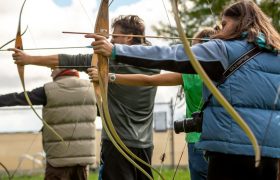Effective Ways to Teach Young Kids How to Read

Books are very important learning tools for young children. Reading is one of the first things a parent should start exposing their infant to as soon as possible. This is a great way to start the communication bond between you and your child. It’s also a good way for them to develop their imaginations as they grow and listen to you read to them. They can picture the story in their mind after you start showing them the pictures in the books. Libraries are also a great way to spend a day with your child, pouring over the different books and teaching them the responsibility of a library and what the reasoning behind one is. People are putting up book boxes on their lawns for people to come by and exchange books. This is another fun way to search for different books for your child and replace the books with books your family doesn’t use anymore. Although some books are worth keeping, it’s always nice to share and see what other children read. It’s also a great way to teach your young children to share.
Read out loud to your children
This helps both of you bond and your child will begin to learn how to love books from early on. If your child enjoys listening to you read to them, this will also help them enjoy learning how to read when they start school. When kids don’t learn about reading at an early age, this will also set back their progress in school when it comes to reading.
You can decide when and where and how much you feel is important to read to your child. Parents should read at least 4 books a day, even if your child is very young. As they get older, this will teach them how to sit still longer and listen to a story. Eventually, you can make it a family goal to read to each other for at least 20 minutes a day.
Children that are newborns and up to a year will be more interested in lullabies, board books with pictures, cloth books with different textures, and songbooks.
Children that are between the ages of one and three will be more interested in rhymes, songbooks, short stories, and storyboard books.
Children between the ages of three and five like the alphabet books, songbooks, picture books, and rhyming books.
Don’t be afraid to ask questions so you can check their comprehension skills
This will also help your children to interact with the story and the main goal is reading comprehension. Don’t try to push your child into sounding out the words because if they don’t have the comprehension, they will just be able to read words and don’t know what they mean.
You can ask your child questions like “where is the cat?” Point to the cat as you ask them where the cat is. You are helping your child learn more words for their vocabulary, and also helping them interact with the story. As your child gets older, ask them to point at the things in the book by themselves. In addition, you can also quiz them on what noise does the wind make? Or what noises does a particular animal make?
 When your child is around three, start asking them questions before you start reading, during the story and after reading the story. Parents can ask their kids what they think stories will be about and ask them questions about the characters and why they made a moral decision? If the characters are showing emotions, parents should ask their kids what emotions they are using. Then you can ask your child if they ever felt mad, glad, happy, sad, etc.. When the story is over, ask your child if they thought the story was going to end that way? Then you can have them give you a brief summary of the story to make sure they are listening and comprehending what the book is about.
When your child is around three, start asking them questions before you start reading, during the story and after reading the story. Parents can ask their kids what they think stories will be about and ask them questions about the characters and why they made a moral decision? If the characters are showing emotions, parents should ask their kids what emotions they are using. Then you can ask your child if they ever felt mad, glad, happy, sad, etc.. When the story is over, ask your child if they thought the story was going to end that way? Then you can have them give you a brief summary of the story to make sure they are listening and comprehending what the book is about.
Be a good role model
You can set an example by reading the newspaper and your own books when your kids are playing so they notice that you enjoy reading as well. Even if you don’t read too much, take some time and let your children see you read something every day to keep their interest in books piqued. You can read cookbooks, current events, your tablet, the Bible, or whatever you are interested in. Share different stories you read with your spouse and older children and see if the young ones are listening. Boys, especially need to notice that their dads are reading. The reason for this is boys are considered to be full of energy so if they notice dad reading and chilling out, they will understand it’s ok if boys like to read.
Parents should remember that children learn as much by example as they do by parents teaching them about different experiences.
Each child learns at their own pace
Parents should know that there is no child that learns how to read at the same pace as an older sibling. You as parents could study different strategies to get them to read for years before they go to school, however; these are just basic guidelines that you can research online or by reading to your child so you can get them interested in reading and comprehension. The main idea is to help them use their imagination, learn more words and what they mean and help them grow into their own pace of reading. Don’t push them and definitely don’t rush your kids to be the perfect reader. This is a good bonding experience while your child feels like the child they should be for their age.
The best way to teach kids to read is to read to them daily, ask questions, set a good reading example yourself when you take your kids out, search for words on storefronts and in many places you go to see if your child recognizes these words from reading. Use the senses when you teach your kids letters and sounds. Read as many books as you can reading all kinds of varieties, including rhyme. Help your child to sound out short words and try to get them to understand the vowels and consonants. Try memorizing words every day with them and most of all, have fun reading, bonding and comprehending. Parents can be their kids best teachers.






